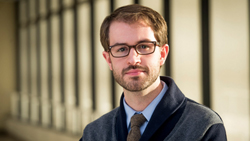
Luker, one of the earliest undergraduate neuroscience majors, graduated summa cum laude from UAB and is now a fourth-year student in the UAB School of Medicine.
Where are you from?
“I grew up in Ashland, Alabama, which is a very small town of fewer than 2,000 people in the Talladega/Anniston area. I went to Clay County High School and graduated valedictorian, though this isn’t saying much considering there were only 55 folks in my graduating class! They closed my high school a couple of years after I graduated and consolidated the county schools into a central high school. I made a 30 on my ACT and was fortunate enough to get a scholarship to UAB.”
How did you discover the program?
“I knew I wanted to go to medical school, and I initially declared myself a biology major. … I very much enjoyed my early coursework in biology, but I wasn’t particularly passionate about it as a major. ... I took Dr. McFarland’s 101 class to see if I might want to be a psychology major instead. I absolutely loved the class, and was on the verge of switching to psychology when I heard about the neuroscience major from a friend, who mentioned Dr. McFarland as one of the key developers. I emailed him right away, and I spoke to him after class the next day, and he gave me everything I needed to apply. He was so excited and passionate about the program, and it was infectious. I am so grateful to him for taking an interest in me and getting me plugged in, because it changed my entire undergraduate experience for the better. But that is the kind of teacher he is, and the kind of person he is. He cares deeply about students and is invested in their success, and he impacted my life for the better through his dedication and support.”
Who was your mentor?
“My research mentor was John Shacka, Ph.D., in the Department of Pathology. He was an excellent mentor and became a good friend through our two years working together. He allowed for a lot of freedom on my part and allotted a lot of ownership and responsibility for the projects I was involved in. I ended up being on two publications from the lab, and presented posters around three times. The highlight was presenting a poster at the Society for Neuroscience meeting in San Diego in 2010 … a staggering number of presentations filled the exhibition halls every day, and it provided a real sense of just how much the field as a whole was exploding.”
How did the neuroscience program prepare you for medical school?
“I feel like the neuroscience program really gave me the mindset of a basic scientist, which has been very beneficial in how I approach problems. … The neuroscience program really develops critical thinking, which is invaluable for medical training. I also felt well-prepared for not only biochemistry and cell biology in medical school, but also the behavioral sciences. … Neuroscience gives you a great background for medical school, regardless of your eventual specialty choice.”
What comes next?
“I graduate in May, and I am applying for psychiatry residency, which is an extension of my interest in neuroscience. I have no doubt that my participation in the neuroscience program influenced what I eventually decided to specialize in. I think that psychiatry is undergoing a period of growth and change, which will only benefit from the continued growth of neuroscience as a field. Our patients are often some of the most ill in medicine, and our treatments, while constantly improving, still often don’t adequately treat some of our most debilitating conditions. As more of our basic science research is translated into the clinical arena, patients reap the benefits of this work.
“In addition to transitioning professionally, my wife and I also just celebrated the birth of our first child this year, so I couldn’t be more excited about the next chapter of our lives!”
--by Jeff Hansen
This article was reprinted from the UAB The Mix website.